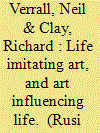| Srl | Item |
| 1 |
ID:
168008


|
|
|
|
|
| Summary/Abstract |
Beliefs, attitudes and behaviour can be influenced in myriad ways. History has consistently demonstrated the struggle between protagonist and antagonist to win over ‘the people’, often through the simultaneous promotion and destruction of places, icons, myths, symbols and stories. Neil Verrall, Mark Dunkley and Toby Gane, three army reserve officers, and Richard Byrne, an independent geographer, describe four interconnected ways in which hostile state actors or non-state terrorist groups might attempt to influence their target audiences as part of strategy.
|
|
|
|
|
|
|
|
|
|
|
|
|
|
|
|
| 2 |
ID:
146323


|
|
|
|
|
| Summary/Abstract |
Graffiti has had a chequered past in the art world and in society in general, and its use in warfare has also been underplayed. In this thought-provoking article, Neil Verrall and Richard Clay illuminate the historical role and impact of graffiti in society, art and war; they argue for a fresh look at its contemporary use within influence operations and behaviour change in a time of ‘warfare in the information age’.
|
|
|
|
|
|
|
|
|
|
|
|
|
|
|
|
| 3 |
ID:
180514


|
|
|
|
|
| Summary/Abstract |
Deception has always been a valid stratagem of war. However, a number of important issues influence how deception could be used, or negated, within contemporary and future warfare. In this article, Neil Verrall clarifies the conceptual understanding of deception and recent developments within it, and highlights ongoing and new challenges. The article concludes by asking whether deception is still possible, or even desirable, in the 21stcentury.
|
|
|
|
|
|
|
|
|
|
|
|
|
|
|
|
| 4 |
ID:
158394


|
|
|
|
|
| Summary/Abstract |
Who can be believed and how should people act in a contemporary atmosphere of alternative facts, the rise of ‘fake’ information and post-truth politics? Neil Verrall and David Mason suggest that although these are not new concepts, the global speed and scale of information and discourse that military commanders need to address to communicate effectively in the current and future operating environments present new and challenging issues.
|
|
|
|
|
|
|
|
|
|
|
|
|
|
|
|
| 5 |
ID:
138432


|
|
|
|
|
| Summary/Abstract |
The changing character of war places increased emphasis on ‘smart power’ and non-lethal ‘soft’ effects. Establishing useful and accurate measures of effectiveness through which to assess the impact of such activities is essential, but these have so far proven elusive. Neil Verrall argues that now is the time for militaries to start thinking differently about the evaluation of full-spectrum effects within the Joint Action approach.
|
|
|
|
|
|
|
|
|
|
|
|
|
|
|
|